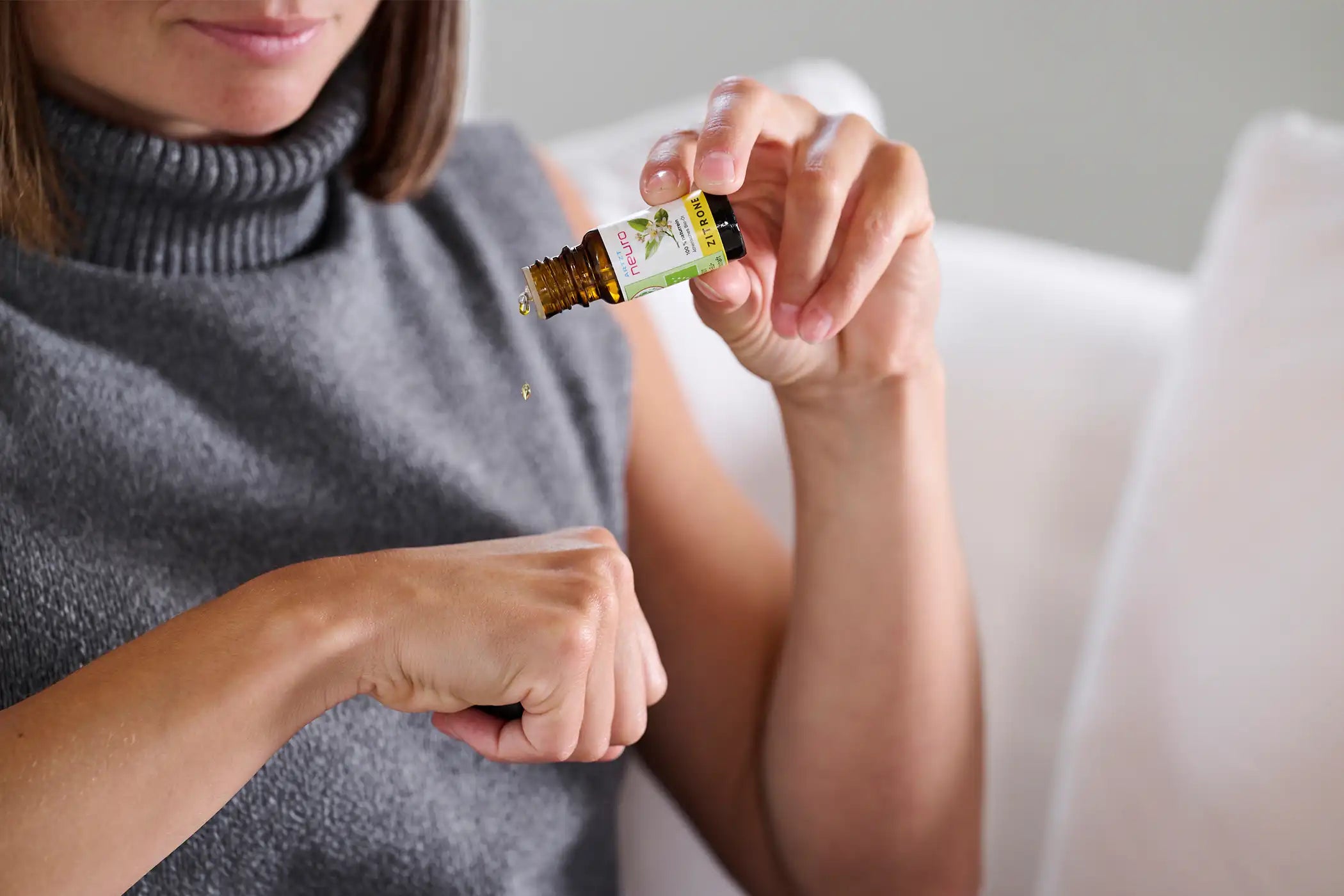
Essential oils during exercise – activate your limbic system
Reading time: 5 minutes
In everyday life, we are exposed to an incredible number of stimuli: visual, auditory, and digital. One sense is often underestimated: the sense of smell. Targeted scent stimuli can influence focus, emotions, reaction speed, and even processing in the limbic system. Scientifically proven, tested in aromatherapy, and also applicable to your training.
Combining neurocentric training with high-quality, pure essential oils creates a simple yet powerful connection: scent and the nervous system. Learn how it works and why you should definitely try it in this article.
Contents
This is the role of scent in neurocentric training
Neurocentric training involves applying targeted stimuli to regulate the nervous system and achieve improved athletic performance. Various stimuli are used. This is where essential oils come into play.
What many people don't know: Smells "bypass" rational thought, so to speak. They act directly on the olfactory bulb and activate the limbic system . This is our center for emotions, memory, stress processing, and motivation. This is where the way your body reacts to a stimulus is determined—both mentally and physically.
What happens when you smell?
Smelling is a biochemical process that takes effect in milliseconds. Your olfactory mucosa contains approximately 30 million olfactory cells with around 350 different odor receptors. They detect millions of different odor molecules. Here's how it works:
- The scent molecules reach the olfactory cells via your nose
- There they trigger electrical signals
- These travel via the olfactory tract directly into the brain
- In the limbic system, neurotransmitters are released, for example dopamine or serotonin
- This creates emotions, memories or concentration
The effect is immediate. A single scent can increase your focus, reduce anxiety , or motivate you. And that's precisely what makes essential oils so exciting for training and therapy. But which oils are there? And how exactly do they work?

Smell training – it's that easy!
Olfactory training involves using specific scents to activate the brain and promote neuroplasticity. Neuroplasticity is like muscle training for your brain.
Studies show that olfactory training with essential oils can, among other things, increase the volume of the olfactory bulb, which in turn can improve cognition, word finding, and concentration. Specifically, there is evidence of improved connectivity between brain regions. These effects occur both in individuals with olfactory loss and in healthy individuals with intact sense of smell.
Instructions for your olfactory training:
- Choose a pure essential oil ( preferably organic)
- Apply 1 to 2 drops to a cloth, your skin on your hand or a mouth tape
- Consciously smell deeply through your nose for 1 to 2 minutes
- Combine the fragrance with a specific physical or mental task
- Observe your reaction: For example, does your energy, focus or relaxation change?
Important: Regularity makes all the difference. Studies show that regular olfactory training can help the brain form new connections, similar to muscle training. This can support not only healthy people but also those suffering from conditions like dementia or Parkinson's.
The perfect combination: essential oils and mouth tape
Essential oils combine perfectly with mouth tape during training. Simply add 1-2 drops directly to the tape and use it as usual. Important: Make sure to use a mouth tape without a breathing hole —this way the oil stays exactly where it belongs.
The top 5 essential oils for your neuro-training
Depending on their ingredients, essential oils can have a mood-enhancing, relaxing, invigorating, or balancing effect . We'll show you five selected oils that are particularly well-suited for your neurocentric training. As with many things, good quality makes all the difference. The best essential oils you use are pure, organic ones.

Lavender oil – soothe and regenerate
Lavender oil contains linalool and linalyl acetate—substances that have anxiolytic, calming, and sleep-inducing effects. It reduces the release of stress hormones and helps the body switch into regeneration mode.
Use of the essential oil in training:
- For relaxation after demanding sessions
- As part of your evening routine
- In case of sensory overload or mental pressure
Lemon scent – activate and focus
Lemon essential oil has an invigorating and mood-enhancing effect. The fresh scent activates, promotes memory performance, and lifts the mood. Ideal for cognitive tasks or for activating before training.
Use of the essential oil in training:
- Before exercises that require high concentration
- Wake up in the morning
- In case of mental fatigue or listlessness
Peppermint – cool, clarify, awaken
Peppermint is one of the most popular essential oils in the practice. It cools, stimulates the mind, and, thanks to its menthol, can improve oxygen intake . The brain gets what it needs: clear focus and greater presence.
Use of the essential oil in training:
- Before coordination exercises
- For hot flashes or lack of motivation
- To improve breathing quality during exercise
Pine needle – centering and stabilizing
Pine needle oil brings the forest into your training. It strengthens, stabilizes, and conveys security through its grounding scent and connection to nature. It can positively influence the immune system and stress resistance .
Use of the essential oil in training:
- In meditation or during cool-down
- After a demanding training
- In case of inner restlessness or nervousness
Eucalyptus – breathe deeply and clarify
Eucalyptus oil is one of the most activating oils. It opens the airways, promotes concentration , and brings fresh energy to any session. It is particularly suitable for mental exhaustion and for improving breathing.
Use of the essential oil in training:
- Before high-intensity intervals
- In combination with breathing techniques
- As an invigorating component in fragrance blends
Conclusion: Better results with essential oils
Essential oils are more than just fragrant plant extracts. Their effects have been scientifically proven time and again, and they can directly and noticeably improve your well-being. Whether by improving your concentration, your emotional stability, or as a supplement for mental exhaustion and stress, they can be achieved simply through aromatherapy. And the best part: You don't need a large setup. Just a few drops and you'll get the perfect dose of nature.
What are you waiting for? Just try it out during your next workout : Use a pure natural oil. Take 30 seconds for yourself. Smell. Feel. React. And then: train. Or afterward—it's entirely up to you.
Sources
- Woo, E., Leal, S.L., Pirogovsky-Turk, E., Gilbert, P.E., & Restrepo, D. (2023). Overnight olfactory enrichment using an odorant diffuser improves memory and modifies the uncinate fasciculus in older adults. Frontiers in Neuroscience, 17, 1200448.
https://www.frontiersin.org/journals/neuroscience/articles/10.3389/fnins.2023.1200448/full - Vance, MA, White, TL, Olsson, SB, Murphy, C., & Chen, B. (2024). Does olfactory training improve brain function and cognition? A systematic review. Neuropsychology Review. Advance online publication.
https://pure.johnshopkins.edu/en/publications/does-olfactory-training-improve-brain-function-and-cognition-a-sy - Thieme Verlag. (2022). Aromatherapy for nervous disorders. Naturally healthy and curable.
https://natuerlich.thieme.de/therapieverfahren/aromatherapie/detail/aromatherapie-bei-nervenstoerungen-1402 - Health Manufactory. (2023). Aromatherapy oils: Nighttime scents can improve memory. Health blog.
https://www.gesundheitsmanufaktur.de/information/gesundheitsblog/aromaoele-naechtliche-duefte-koennen-das-gedaechtnis-verbessern - Cavedo, E., Grothe, MJ, Lista, S., Teipel, S., & Hampel, H. (2022). Olfactory enrichment in older adults at risk of dementia: Results from the PREVENT Dementia Cohort. Alzheimer's & Dementia, 18(12), 2404-2416.
https://alz-journals.onlinelibrary.wiley.com/doi/10.1002/alz.12717 - Aroma Forum International (2021). The brain and aromatherapy – an excellent duo.
https://aroma-forum-international.de/das-gehirn-und-die-aromatherapie-ein-ausgezeichnetes-duo/ - Vienna Nursing Congress (2018). Aromatherapy in Practice – Effects and Use. Lecture notes.
https://www.pflegekongress.at/html/publicpages/154408597295995.pdf - Hatt, H. (2007). Taste and smell. In RF Schmidt & F. Lang (eds.), Human Physiology (Springer Textbook). Springer.
https://link.springer.com/book/10.1007/978-3-540-32910-7






Leave a comment
This site is protected by hCaptcha and the hCaptcha Privacy Policy and Terms of Service apply.